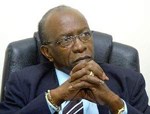FIFA vice president breached FIFA code to sell 4500 World Cup tickets

12.09.2006
By Kirsten SparreThe reports were produced for the attention of FIFA’s secretary general Urs Linsi and handed to FIFA’s bosses before and during the World Cup. But the findings were suppressed, writes Jennings in articles published in the British newspaper Daily Mail and on his own website – aptly titled transparencyinsport.org
The two reports from Ernst & Young are also published on Jennings’ website together with the minutes from a February meeting in FIFA’s Committee for Ethics and Fair Play which considered whether Jack Warner was guilty of a conflict of interest because he owned the Simpaul Travel Agency that was selling package trips to the World Cup. (See previous articles on Play the Game).
The committee ruled that Warner was guilty of a conflict of interest and the report went to FIFA’s Executive Committee. But Warner was exonerated after he claimed that he and his family had severed all links with the Simpaul company.
In fact, Jack Warner had done no such thing. His son Daryan continued to sell thousands of tickets which his father obtained improperly from FIFA. The travel agency supplied 900 tickets to England’s first round matches, 1,500 tickets for Mexico’s initial games and 3,000 tickets for Japan’s first three matches.
Two auditors’ reports prove breaches of terms for ticket sale
Warner’s demand for tickets became so outrageous that the company that operates FIFA’s ticket office tipped off Ernest & Young who had been appointed to look into potentially dodgy deals. On April 11 the auditors forwarded their first report on Warner to FIFA which documented that the vice president from Trinidad and Tobago was in breach of FIFA rules.
Nothing happened and the World Cup began. Then a travel agent from Switzerland turned up at FIFA’s hotel in Berlin and said that he had not received all the tickets he had paid for. Again the auditors investigated ed Jack Warner and his travel agency and came up with the same conclusion: Tickets bought by Warner had been transferred or resold in breach of the ticketing terms that applied to the World Cup.
Again FIFA took no action. The action was reserved for Botswana’s Ismail Bhamjee who was sent home from the World Cup in disgrace because he had been exposed by a newspaper for selling the comparatively small number of 12 overpriced World Cup tickets.
A case in point for FIFA’s new Ethics Committee
FIFA is due to hold its next executive meeting at the end of this week, and Jennings’ exposure should give food for thought for committee members. On the agenda is among other things the ratification of a new Code of Ethics which will regulate the set-up, purpose and duties of the newly formed FIFA Ethics Committee.
Meanwhile Jack Warner has shown no interest in answering questions from Andrew Jennings on the matter of World Cup tickets.
However, in his native Trinidad and Tobago the local newspaper Trinidad Express today quotes Warner for a personal observation on the greed that seems to have become part of football. Criticising referees attending an instructor’s course Warner said:
“Some of our referees have been mercenaries. Most times all they are concerned with is how much the can earn for officiating the game, and they care very little about their performance on the field.”





